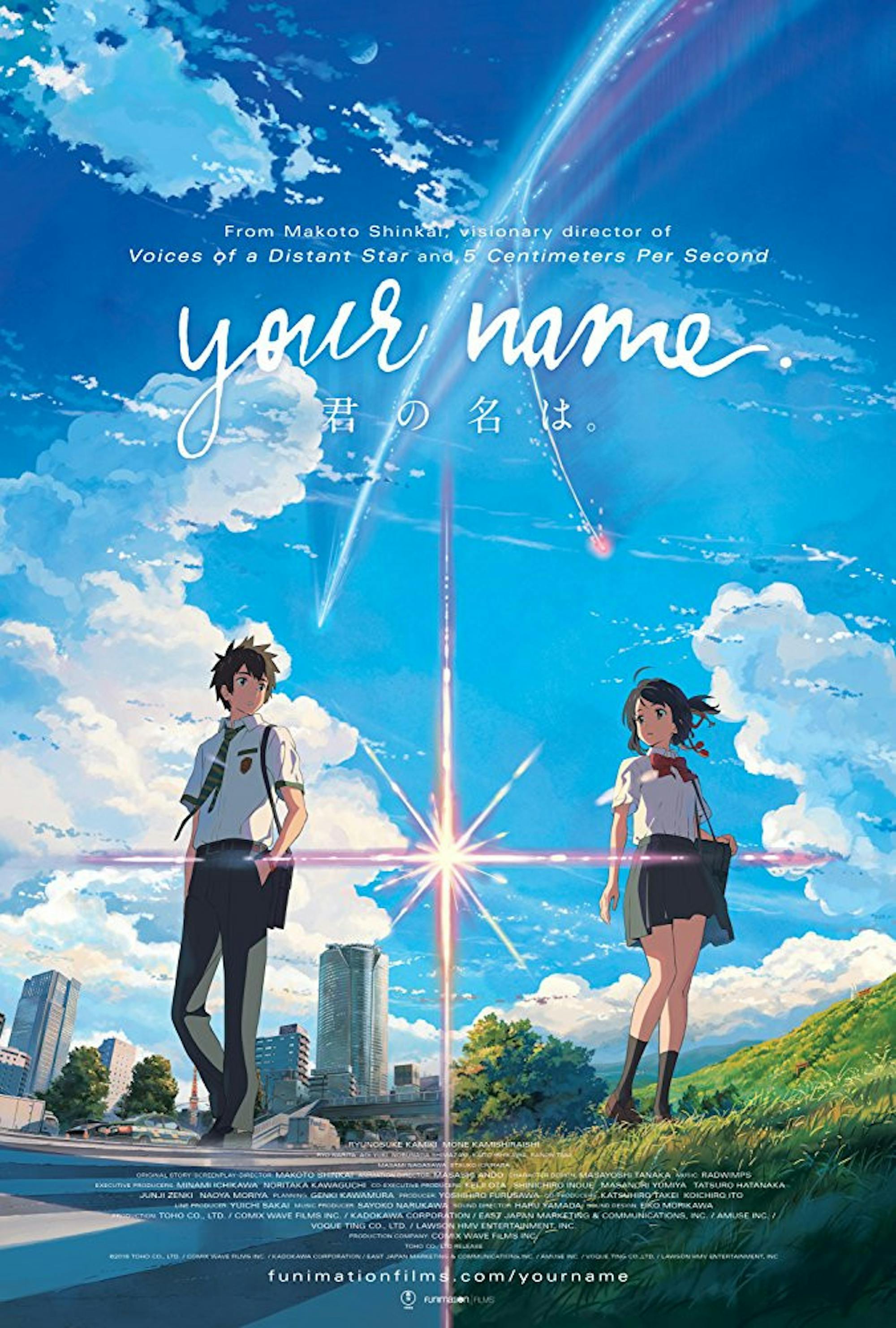Partnering with UNIQLO USA, the Museum of Fine Arts, Boston presents “The Boston Festival of Films from Japan” throughout February. The program screens Japanese films from different genres, including live action, documentary and animated. The last genre, a quintessential part of modern Japanese media, is represented by the highest-grossing anime film of all time, “Your Name" (2016).
Directed by Makoto Shinkai, “Your Name” tells a fantasy tale of two sporadically body-swapping adolescents. Mitsuha, a high school girl living in the fictional town of Itomori, feels confined by the enclosed landscape and social atmosphere of her small town and yearns to become “a handsome Tokyo boy in [her] next life.” Soon after her playful wish, she finds herself periodically exchanging bodies with a Tokyo boy named Taki. The two teenagers quickly become enthralled by this unusual phenomenon. However, the novelty soon wears off and turns traumatic when Taki discovers an annihilating comet crash that has happened in Itomori three years prior to the start of his body-swaps with Mitsuha.
“Your Name” gathers the essentials of a commercially successful anime film: magic, young love and spectacular visuals, all of which make the film a fun and cathartic escape from reality. The film offers fantastical explanations of little-understood psychological phenomena such as dreaming and déjà vu. In the film, the body-swaps between Mitsuha and Taki occur during their sleep and remain as vague and surreal memories after they wake up. Therefore, the two protagonists at first regard the recollections of their body-swaps as merely déjà vu or memories of dreams. By framing these seeming illusions as true experiences later in the story, the film invites its viewers to reconsider fantasy and cheerfully reimagine the possibilities of human life.
Such interplay between fantasy and reality is mirrored in the film’s portrayal of the simultaneous joy and vulnerability of young love. As body-swaps occur more regularly, Mitsuha and Taki start to recognize the reality of their experiences and begin leaving each other notes to communicate. The two adolescents gradually develop affection for each other, although their feelings are not explicitly revealed until near the end of the film. Mitsuha and Taki enjoy each other’s spiritual company but are constantly subject to the insecurity of losing it. And they eventually do, as they have absolutely no control over the frequency and duration of their body-swaps. This quote from Taki in the film epitomizes such a paradoxical sense of both absence and presence in young love: “I’m always searching for something, for someone. This feeling has possessed me I think, from that day … That day when the stars came falling." The film’s rendering of young love seems to please humans’ inexplicable appetite for bittersweetness.
Meanwhile, beautiful scenes of the serene Itomori and the sublime night sky with a falling comet provide both visual and auditory pleasure for viewers. Quite contrary to its American counterparts, namely Disney, Japanese animated feature films tend to be less theatrical and closer to real life. In “Your Name,” the consistent color palette of emerald green and silence (except for the sound of cicadas) sketch an idyllic outlook for the town of Itomori. In illustrating the falling comet, the film adopts a futuristic and enigmatic color palette mostly consisting of purple and navy. The colors’ saturation recedes as they extend toward the horizon, thus creating a sense of abysmal depth and cosmic awe.
That being said, there is a darker side to “Your Name.” The comet disaster that destroys Itomori is likely an innuendo of the atomic bombing at Hiroshima and Nagasaki in World War II. The depiction of the victims in “Your Name” strongly resembles that of the film “Barefoot Gen" (1983), which explicitly illustrates the Hiroshima bombing. In “Barefoot Gen,” two siblings curiously stare at the plane that is about the drop the atomic bomb and wonder about its purpose; Mitsuha and her sister similarly gaze and marvel at the falling comet in “Your Name.” Both films also emphasize the innocence of the victims. Victims shown in “Barefoot Gen” are mostly siblings, mother-child-pairs, the eldery and even pets, all of whom, due to their cuteness or vulnerability, tend to stereotypically generate the most empathy among all possible subjects. In addition, the story makes clear that the big round lake in Itomori was formed by a similar comet crash a long time ago. Therefore, the comet crash depicted in the film results in two comet craters in Itomori, which correspond with the two bombings of Japan during World War II.
The body-swaps between Taki and Mitsuha serve as fictional testimonies of the inseparability of the past and present. Mitsuha’s grandmother poetically explains in the film, “The braided cords that we make ... represent the flow of time itself. They converge and take shape. They twist, tangle, sometimes unravel, break and then connect again.” History does not have an absolute start or end; it contains intervals instead. Meanwhile, Taki’s attempt to find Mitsuha and eventually revive the residents in Itomori in “Your Name” symbolizes contemporary Japan’s desire to empathize with and rewrite its WWII trauma. On that account, “Your Name” affirms the trope regarding animation that it primarily seeks the “happily-ever-after.” While this practice is often criticized in animation since it can be interpreted as sugar-coating reality, the pursuit of happy endings can be read as genuine expression of the universal human desire for good and recovery from pain.
Despite the seemingly unrealistic format of animation, works of famous directors like Hayao Miyazaki to Makoto Shinkai still feel like fantasy-world roller coasters that always ultimately wind their way back to reality.
'Your Name' shows history reimagined

A promotional poster for "Your Name," the highest grossing anime film of all time. (Courtesy Amuse Animation)
Summary
Weaving past and present together, "Your Name" beautifully captures its audience in a fantasy world that speaks to a better reality.
4 Stars





